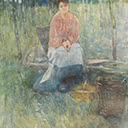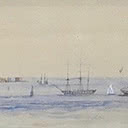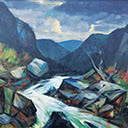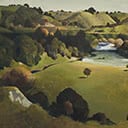New York Harbour 1852
16 x 186 cm
est. $8,000 - 12,000
Provenance:
Never before offered for sale
Inherited by vendor's maternal grandmother, surname Wilkie, who was employed at Westoe,the Fox family's Rangitikei homestead
William Fox arrived in Wellington in 1842 and become editor of the New Zealand Gazette and Britannia Spectator, before being appointed Resident Agent at Nelson for the New Zealand Company in 1843. He subsequently played a leading part in politics and held the office of Premier on four occasions. He was knighted in 1879. In his early years Fox explored much of the Wairarapa and the South Island.
Fox's greatest contribution to New Zealand history after the struggle for self-government in the 1850s, was his work in Taranaki in the early 1880s. He was a member of the West Coast Commission which consisted of Francis Dillon Bell and himself. A third commissioner, Hone Mohi Tawhai, declined to serve when he heard that his colleagues were to be Fox and Bell. No doubt he questioned the propriety of their appointments. The Commission was charged with the duty of inquiring into the numerous promises allegedly made by successive government officials to the Taranaki Maori, and into all disputed land claims in that province.
Fox Glacier was named to commemorate Fox's visit to the region as Prime Minister of New Zealand in 1872. The Wairarapa town of Foxton, founded in 1885, was also named after him. In his later years Fox continued to undertake considerable physical exercise, climbing Mount Taranaki in 1892, aged 80. He died in Auckland in 1893.
In 1851, Fox travelled to London on behalf of a group of Wellington settlers. There he met Edward Gibbon Wakefield, elder brother of William and Arthur. He discussed his ideas about a constitution for New Zealand, strongly supporting self-rule, provincial autonomy, and two elected houses of parliament. He also attempted to meet Earl Grey, the British minister for colonial possessions, but was refused. When a constitution was promulgated the following year it incorporated some of Fox's ideas, but was not satisfactory to him. Before returning to New Zealand, Fox and his wife spent some time travelling in America and Cuba. He documented this trip in an impressive series of watercolours, many of which are held in the collection of Alexander Turnbull Library.
New York Harbour 1852, is composed across seven sheets of paper - this type of watercolour documentation is extremely rare. The panorama begins at the Battery looking across to Brooklyn, Green Island, Staten island to the New Jersey Shore and out to the mouth of the Hudson River. On the far right, naval steamship USS Mississippi, is seen departing the Hudson en route to Japan. She was later destroyed in the Bombardment of Port Hudson, Louisiana.
For more information on this piece, please download this PDF (48KB)





